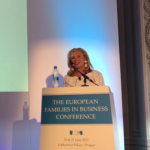This post was written by ARI SYTNER

Years ago, an older man visited our synagogue once each month to make a modest donation. Although I thanked him each time, he always gave the same reply, “rabbi, please don’t thank me, I do it because I am selfish. I just enjoy the way I feel when I give charity”.
Whether helping individuals or organizations, everyone has different motivations for why they donate, volunteer or help out. In the corporate world, there are new massive trends which encourage charity and volunteerism.
Why would a company care whether their employees donate to charity? Why would corporations like Apple and Google offer programs, where they match the charitable contributions of their employees?
It could simply be because they want to be a part of the culture of “do-gooders”. It might be because industrial psychologists have suggested that employees are more productive when they feel that they are helping the world (not just selling technology). Or, perhaps they give so generously to avoid the extra tax burdens, which will inevitably hit their multi-billion dollar bottom lines.
Regardless of their ulterior motives, you have to admit that great things are happening as a result of these corporate trends which encourage kindness and philanthropy. But, let’s be clear, most companies do not exist, nor were they created just to bring social welfare reform to the world. Only as a result of their incredible success, are they able to give back to the community and help the world.
Imagine, however, if we flipped the model. What might it look like if a company were formed exclusively to help the world, while also yielding a profit?
I recall once partnering with a very generous oral surgeon, who invested in an ice-cream franchise. I curiously asked him why he was expanding into this market, if he was already maintaining a highly successful and lucrative medical practice. He responded, that he works as hard as he does just to be able to give more charity. However, he was frustrated by his own financial limitations.
Therefore, instead of donating $200,000 to charity, he invested it in a business, which was going to yield more than double his initial investment. Then he would donate every penny of the annual profit to charity. Additionally, his kindness was bringing a family-friendly business to the community, as well as offering employment to a number of people. Many other small businesses will equally allocate a tithe of at least 10% of their profit to go directly to charitable causes. Thus, the more successful they are, the more they can give back to their community.
It is this win-win-win model of Venture-Philanthropy, which puts the desire to help others as the foundation and motivation to running a successful company.
I was recently introduced to another such inspiring company called Book Bugs (www.bookbugs.net). Their motto is, “where reading meets giving”.
They are basically a monthly book club for kids, where children can receive a brand new book each month to help inspire them to read. Here’s the best part – for every three books that your child receives, a brand new book is donated to an underprivileged child.will
When I heard their mission, I simply could not resist and immediately signed up. While three of my kids love reading, I have not been able to motivate my youngest 3rd-grade daughter to read. I’ve tried getting her all the “usual” books (Harry Potter, Babysitters Club, Junie B. Jones, Magic Treehouse, Judy Blume), none of which kept her interest for more than 10 minutes.
When I joined Book Bugs, they had me fill out a form telling about my child’s interests and hobbies. I was shocked when a few days later a book that I had never before heard of arrived in the mail. It was absolutely perfect and she could not put it down! Clearly they know more about what 8-year-old girls like to read than I do!
Now, my daughter looks forward to a new book every month. But more importantly, I love that I am also helping the world, by supporting a company that is giving the same gift of reading to a less fortunate child. (Its good to note that the company is running a promotion now, where you can get your first month for free with the promo code: GIVEBOOKS2015).
I hope that more companies will embrace this model of Venture-Philanthropy, where their business model will foremost aim to do great things in the world, beyond the wonderful products or services they offer.
While it feels great to donate and help other people, I would hardly call any act of charity selfish! Anyone who helps others is doing a good deed. But if we could direct our entrepreneurial motivations to be built upon compassion and altruism, perhaps we could inspire and help more people in the process. I am not suggesting that a company earn less and report smaller profits to their shareholders. Rather, to change their definition of success altogether.
Perhaps the very success of a company should be measured, not my how much they bring in, but my how much they can give back.
This post was originally posted by Ari Sytner. To learn more about organization, leadership, relationships, and anything else that might be troubling you, visit Ari’s inspiring blog at http://www.asytner.com/






